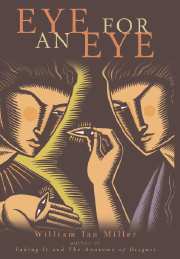Book contents
- Frontmatter
- Contents
- Preface: A Theory of Justice?
- 1 Introductory Themes: Images of Evenness
- 2 The Talion
- 3 The Talionic Mint: Funny Money
- 4 The Proper Price of Property in an Eye
- 5 Teaching a Lesson: Pain and Poetic Justice
- 6 A Pound of Flesh
- 7 Remember Me: Mnemonics, Debts (of Blood), and the Making of the Person
- 8 Dismemberment and Price Lists
- 9 Of Hands, Hospitality, Personal Space, and Holiness
- 10 Satisfaction Not Guaranteed
- 11 Comparing Values and the Ranking Game
- 12 Filthy Lucre and Holy Dollars
- Conclusion
- Notes
- Works Cited
- Index
12 - Filthy Lucre and Holy Dollars
Published online by Cambridge University Press: 18 December 2009
- Frontmatter
- Contents
- Preface: A Theory of Justice?
- 1 Introductory Themes: Images of Evenness
- 2 The Talion
- 3 The Talionic Mint: Funny Money
- 4 The Proper Price of Property in an Eye
- 5 Teaching a Lesson: Pain and Poetic Justice
- 6 A Pound of Flesh
- 7 Remember Me: Mnemonics, Debts (of Blood), and the Making of the Person
- 8 Dismemberment and Price Lists
- 9 Of Hands, Hospitality, Personal Space, and Holiness
- 10 Satisfaction Not Guaranteed
- 11 Comparing Values and the Ranking Game
- 12 Filthy Lucre and Holy Dollars
- Conclusion
- Notes
- Works Cited
- Index
Summary
The man-comparing contest was not about reducing the value of men to money. It was about ranking them according to honor; material wealth was only part of the equation. Commensuration does not require coin, though some types of trade-offs are easier to make when there is a ready way to monetize values. The difficulties talionic cultures had in pricing life were not moral or conceptual; they were practical. Their problems with pricing what we think of as priceless were the inevitable problems of finding a workable medium of exchange.
Coin, as I noted earlier, may not yet have been invented and once it had been, it was in chronically short supply. One had to select among various kinds of money substances, some providing the measure of value, others acting as the means of payment. Thus it was that people, pigs, silver, grain, peppercorns, cloth, hides, blood, or oxen could now be a measure of value, now a means of payment, some more likely to play one role than the other. Even when there was coin, the exchanges were hardly much easier, for coins, with their varying weights and silver content, presented the same problems of quality that sheep or humans did when they served money-like functions. Just as some animals and some humans are more valuable than others, so too not every silver shilling was in fact a silver shilling. That is why merchants did not abandon scales as a tool of their trade until quite recently.
- Type
- Chapter
- Information
- Eye for an Eye , pp. 180 - 196Publisher: Cambridge University PressPrint publication year: 2005



